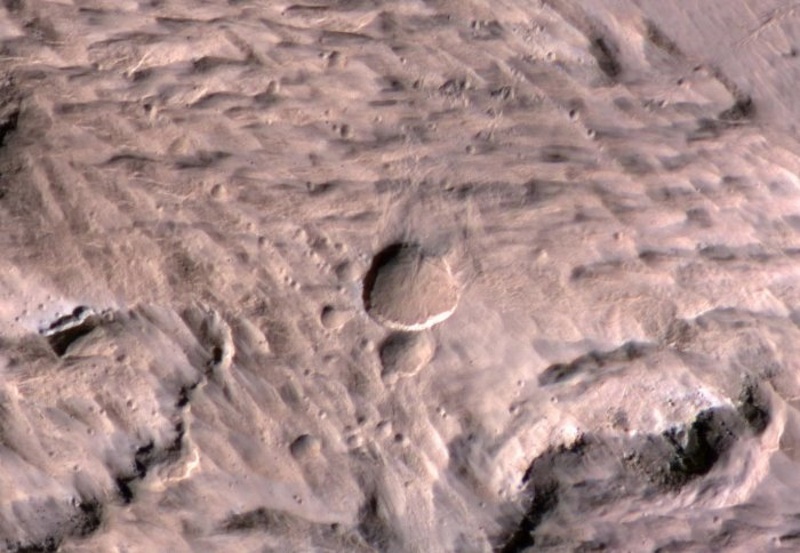- Home
- Science
- Science News
- Life on Mars May Be Hidden Deep Beneath Surface: Study
Life on Mars May Be Hidden Deep Beneath Surface: Study

Researchers analysing samples from Mars' surface have not yet conclusively detected organic compounds that are indigenous to Mars and which would be indicators of past or present life.
Scientists now suggest that a good place to find these organic compounds would be deep underground - from rocks that have been blasted to the surface by meteor impacts.
This is because such rocks have been sheltered from the Sun's harmful radiation and from chemical processes on the surface that would degrade organic remains.
"We've literally only scratched the surface of Mars in our search for life, but so far the results have been inconclusive," said Professor Mark Sephton, co-author of the research from Imperial College, London.
Rocks excavated through meteorite impacts provide scientists with another unique opportunity to explore for signs of life, without having to resort to complicated drilling missions.
"Our study is showing us is that we may need to be nuanced in our approach to the rocks we choose to analyse," Sephton added.
The team from Imperial College London and University of Edinburgh has replicated meteorite blasts in the lab.
The aim was to see if organic compounds encased in rock could survive the extreme conditions associated with them being blasted to the surface of Mars by meteorites.
The study, published today in Scientific Reports, suggests that rocks excavated through meteorite impacts may incorrectly suggest a lifeless early Mars even if indicators of life were originally present.
Meteorites often contain organic matter not created by life, which have some similarities in their organic chemistry to land plants. The team infer that they also should also be resistant to blast impacts.
The study could help future missions to Mars determine the best locations and types of blast excavated rocks to examine to find signs of life.
"The study is helping us to see that when organic matter is observed on Mars, no matter where, it must be considered whether the sample could have been affected by the pressures associated with blast impacts," noted Dr Wren Montgomery from the department of earth science and engineering.
The next steps will see the team investigating a broader range of pressures and temperatures.
This could help future Mars missions further refine the types and locations of rocks that they can analyse for signs of past or present life.
Catch the latest from the Consumer Electronics Show on Gadgets 360, at our CES 2026 hub.
Related Stories
- Samsung Galaxy Unpacked 2025
- ChatGPT
- Redmi Note 14 Pro+
- iPhone 16
- Apple Vision Pro
- Oneplus 12
- OnePlus Nord CE 3 Lite 5G
- iPhone 13
- Xiaomi 14 Pro
- Oppo Find N3
- Tecno Spark Go (2023)
- Realme V30
- Best Phones Under 25000
- Samsung Galaxy S24 Series
- Cryptocurrency
- iQoo 12
- Samsung Galaxy S24 Ultra
- Giottus
- Samsung Galaxy Z Flip 5
- Apple 'Scary Fast'
- Housefull 5
- GoPro Hero 12 Black Review
- Invincible Season 2
- JioGlass
- HD Ready TV
- Laptop Under 50000
- Smartwatch Under 10000
- Latest Mobile Phones
- Compare Phones
- Realme Neo 8
- OPPO Reno 15 FS
- Red Magic 11 Air
- Honor Magic 8 RSR Porsche Design
- Honor Magic 8 Pro Air
- Infinix Note Edge
- Lava Blaze Duo 3
- Tecno Spark Go 3
- Acer Chromebook 311 (2026)
- Acer Chromebook Spin 311
- Lenovo Idea Tab Plus
- Realme Pad 3
- Moto Watch
- Garmin Quatix 8 Pro
- Haier H5E Series
- Acerpure Nitro Z Series 100-inch QLED TV
- Asus ROG Ally
- Nintendo Switch Lite
- Haier 1.6 Ton 5 Star Inverter Split AC (HSU19G-MZAID5BN-INV)
- Haier 1.6 Ton 5 Star Inverter Split AC (HSU19G-MZAIM5BN-INV)







![[Sponsored] Haier C90 OLED TV | Dolby Vision IQ, 144Hz OLED and Google TV in Action](https://www.gadgets360.com/static/mobile/images/spacer.png)









